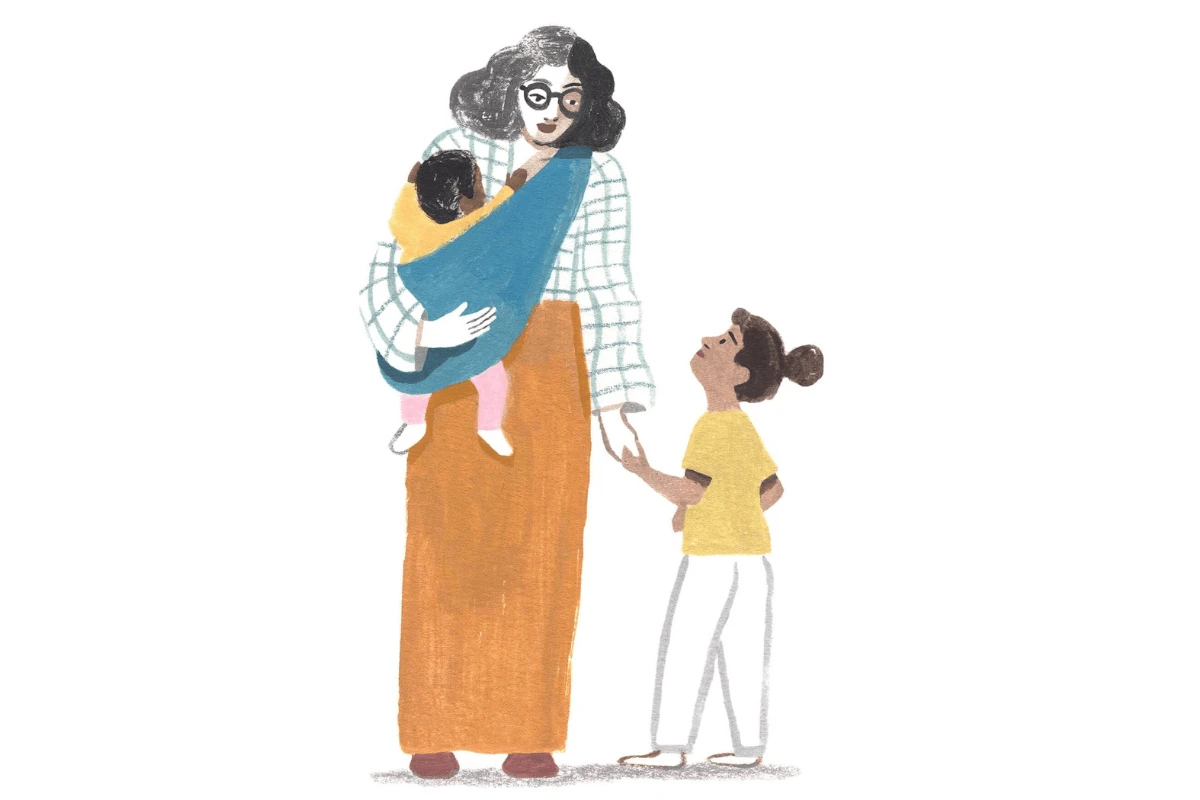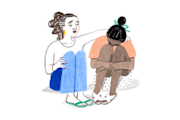Having a baby is an exciting, scary, and hectic time. The actual process of giving birth will likely kick up a veritable storm of hormones, causing intense emotional highs and lows. Up to 80% of moms experience what’s known as the “baby blues” in the days after giving birth. This is what we call totally typical feelings of anxiety, exhaustion, and irritability that surface after such an intense physical and psychological experience.
But for some new moms, these feelings linger, worsen, and mutate into something much more serious: postpartum depression (PPD). PPD is a profound and debilitating depression that presents after giving birth, and is thought to occur in up to 14% of those who give birth.
If you’ve just had a baby and are feeling off, here are some things that might help you determine if you’re in a temporary period of baby blues, or whether you should talk to a doctor about the possibility of PPD.
1. You’re having severe mood swings
A lot of new moms are easily irritated because they are (understandably!) exhausted and overwhelmed. But extreme mood swings, like going from uncontrollably angry to totally numb, could be indicative of something more serious going on than the baby blues.
2. You’ve experienced a panic attack since giving birth
Worrying about your newborn is totally understandable, even for those with generally low levels of anxiety. But if your anxiety is lasting hours or days—and especially if you’re experiencing discrete bouts of acute panic known as panic attacks—this could be an indication of PPD.
3. You’re not sleeping at all, or you’re sleeping way too much
Bringing home a newborn is a huge adjustment, especially when it comes to your sleep schedule. But if you’re unable to actually rest when you have the chance to, this could be cause for concern. On the other side of the coin, if sleeping is getting in the way of spending time with your new baby, you may have PPD.
4. You feel like an inadequate mom
You’re going to be nervous and overwhelmed by the responsibility of caring for a newborn baby (not to mention raising a human being), and especially so if you’re a first-time mom. But if these fears of inadequacy interfere with your caring for your baby—or if you’re afraid you will actually damage your child, you should talk to a doctor.

5. You’re withdrawing from friends and family
Some new moms want to be alone with their babies for a while; some want all the help they can get from family and friends. Neither is right or wrong. But if you used to see your family regularly, and now the thought of spending time with them feels like such a chore that it’s been months since you’ve seen them, this might be a sign that you’re experiencing something beyond the more standard baby blues.
6. You’ve had thoughts of harming yourself or your baby
If you’ve thought at all about hurting yourself or your child, you need to contact your doctor immediately. This is a sign that you are probably suffering from PPD.
7. Your symptoms last for more than two weeks
The baby blues present in the first few days after giving birth, and generally subside within two weeks as you adjust to your new life as a mom. If your symptoms last longer than that or have gotten worse, you could be experiencing PPD.
It can be hard to tell the difference between postpartum depression and reasonable, expected anxiety after the birth of a baby, but PPD is a very serious condition. If you think you or someone you know is suffering from PPD, it’s important to talk to a doctor because while serious, PPD is treatable with a combination of talk therapy and medication.
Historically, new moms have often chosen not to report their postpartum depression symptoms because of shame around their thoughts and feelings, and the false assumption that any negative feelings toward their child or new role as a mother makes them a bad parent. Postpartum depression does not make someone a bad mom. Taking care of yourself so you can take care of your baby—that makes you a good mom.
For more information and resources on PPD, check out Postpartum Support International or PospartumDepression.org.
If you're experiencing any of these symptoms, or want support in adjusting to life as a parent, consider seeing a mental health professional. MeetMonarch can help you find a therapist that specializes in postpartum depression.
Take our free, online depression quiz
Concerned you might be depressed? Take our free online depression quiz to determine whether you are experiencing symptoms of depression. Takes less than 3 minutes to get your results.
Baby blues after pregnancy. (2019). Retrieved from Marchofdimes.org website: https://www.marchofdimes.org/pregnancy/baby-blues-after-pregnancy.aspx
Hirst, K. P., & Moutier, C. Y. (2021). Postpartum Major Depression. American Family Physician, 82(8), 926–933. Retrieved from https://www.aafp.org/afp/2010/1015/p926.html
McKelvey, M. M., & Espelin, J. (2018). Postpartum depression. Nursing Made Incredibly Easy!, 16(3), 28–35. https://doi.org/10.1097/01.nme.0000531872.48283.ab
Postpartum depression. (2021). Postpartum Depression. Retrieved from https://www.apa.org website: https://www.apa.org/pi/women/resources/reports/postpartum-depression
Postpartum depression - Symptoms and causes. (2018). Retrieved from Mayo Clinic website: https://www.mayoclinic.org/diseases-conditions/postpartum-depression/symptoms-causes/syc-20376617
Postpartum depression - Diagnosis and treatment - Mayo Clinic. (2018). Retrieved from Mayoclinic.org website: https://www.mayoclinic.org/diseases-conditions/postpartum-depression/diagnosis-treatment/drc-20376623
PostpartumDepression.org - Helping Women with Postpartum Depression. (2020, December 15). Retrieved from PostpartumDepression.org website: https://www.postpartumdepression.org/
Postpartum Support International - PSI. (2020). Retrieved from Postpartum Support International - PSI website: https://www.postpartum.net/
The Baby Blues | American Pregnancy Association. (2019, January 25). Retrieved from American Pregnancy Association website: https://americanpregnancy.org/healthy-pregnancy/first-year-of-life/baby-blues-71032/
Wilkinson, A., Anderson, S., & Wheeler, S. B. (2016). Screening for and Treating Postpartum Depression and Psychosis: A Cost-Effectiveness Analysis. Maternal and Child Health Journal, 21(4), 903–914. https://doi.org/10.1007/s10995-016-2192-9











